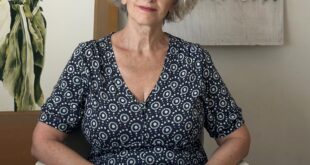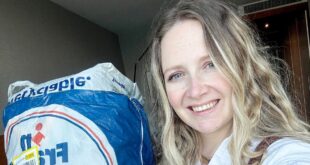“Sometimes we’d be lost without them.”
The NHS today has a terrifying number of plates to spin, all while facing enough challenges and workloads that would make Sisyphus run for cover.
So when Adele Turner, an advance practitioner of blood transfusion at Lincoln County Hospital, says this about the Lincolnshire Emergency Blood Bikes Service (LEBBS), she is not using hyperbole.
Adele has become the NHS liaison with LEBBS in Lincolnshire and has seen at first hand what good they do.
“The relationship between us is really good,” she added.
“We talk quite frequently of how to improve things and how to make our interactions with both our teams better.
“I’ve met pretty much the whole team now and everybody is of the same ethos – they’re really driven, they really want to provide care for the patient.”
LEBBS was set up in January 2012 and began runs in April 2013, initially serving Pilgrim Hospital, in Boston, and Grantham Hospital, before Lincoln was added six months later.
Their patch grew once again in 2016 when they took on hospitals in Scunthorpe, Grimsby and Goole, while expanding its delivery range to Hull Royal Infirmary and the regional NHS Blood and Transplant Centre in Barnsley.
It now offers out-of-hours courier cover – including midweek nights and round-the-clock weekend shifts – to ensure delivery 24 hours a day, 365 days a year.
“We rely massively on them,” said Adele.
“Now that they’ve got more volunteers, they can pretty much run a 24/7 service for us which reduces our taxi costs and saves the NHS money.”
Today, the Lincolnshire group, one of a network of 32 county-based blood bike charities, has 150 members, at the heart of which is its volunteer band of riders.
Among them is Richard Barker, a lifelong biker who decided to hit the road in retirement after a career in sales and marketing.
Whatever it is, motorcycling inspires an unshakeable devotion among its disciples.
For the blood bike volunteers, the love of life on two wheels is mixed equally with a wish to help our health service.
“We are all passionate about motorcycling, and we’re all, for many reasons, dedicated to helping the NHS in its times of need,” said Richard.
“Over the last two or three years I’ve had one or two medical issues myself, and when you’re there at that point it makes you realise just how wonderful these people are and what pressures they’re under.”
Their blood bikes name perhaps sells them slightly short in the range of medical essentials they carry.
As well as blood, their rapid response teams also deliver pathology and microbiology specimens, medical notes, pharmaceutical products, equipment and donor breast milk.
“They have been using taxis, Royal Mail, couriers and all sorts to get things from point A to point B,” said Richard.
“The cost is immense and often not that reliable, so we’ve taken all that away.
“It’s the reliability of our service that’s important. If they booked a courier, he might be late or doesn’t turn up.
“But you can guarantee that as soon as LEBBS has accepted the job we will be at the collection point within the first hour.”
While many trips are planned ahead, riders are also called up for urgent trips, potentially with lives on the line.
“There was a guy in Boston Hospital who had an odd blood type and without any help they wouldn’t have been able to give him a transfusion,” Richard recalled.
“So we took on the task of running to Barnsley with samples of his blood, having them tested and bringing the blood back to have his transfusion and it saved his life.
“There are lots of stories like that.”
The charity has evolved to expand its services in recent years.
It now couriers fresh blood to the Lincolnshire and Nottinghamshire Air Ambulance HQ every day as part of its Blood On Board scheme which allows medics to carry out transfusions on board.
“They play a huge, huge role in our pre-hospital care where we provide blood for the air ambulance,” Adele explained.
“That service would not be able to run without LEBBS.”
And last winter, LEBBS riders were asked to take baby’s heel prick tests to Sheffield Children’s Hospital over the Christmas period while the postal service came under strain.
The tests screen newborns for potentially life-threatening medical conditions.
Riders also do a weekly run to Nottingham to take surplus fresh frozen plasma (FFP).
“Nottingham is a major trauma centre and they use more than us, so that reduces our wastage and means the donors’ precious FFP isn’t going to waste,” Adele said.
One could say that’s real value for money – if it were not voluntary and delivered free of charge.
But the charity, in turn, needs donations to cover the high costs of fuel and the maintenance of their well-used bikes.
Last year, LEBB volunteers racked up more than 125,000 miles and 2,080 hospital visits.
The demand has carried into 2024. In the first quarter, the charity completed 577 runs, covering more than 44,000 miles of tarmac – more than double the first-quarter figure for 2023.
The county group is split into three geographical areas – north Lincolnshire and Humberside (north), Lincoln and surrounding areas (central) and South Lincolnshire.
Duty controllers handle the calls from hospitals and pathology laboratories and dispatch riders closest to the hospital collection point.
Although, in practice, it doesn’t always work out like that.
On Richard’s first shift, his day started with a ride from his Crowland home to Boston, but by the end of the day he had travelled all the way to Grimsby.
Not that it’s a bother for Richard, an observer and trainer for the Institute of Advanced Motorists who helps prepare new volunteers for the advanced qualifications they need to ride for the charity.
“I did 412 miles over the two days of that weekend and was in the saddle for 13-and-a-half hours which for an old bloke is some achievement,” he chuckled.
“It fires me. I’m of an age where the respect I have for the NHS at grassroots level is unbounded. I have a great admiration for the people I come into contact with.”
And the feeling seems to be mutual.
“They are so dedicated to the cause – they do an amazing job,” said Adele.
“Over the last two years we’ve made more improvements than we’d made in the last 10.
“I can’t thank them enough. At the end of the day it’s for the good of the patient.”
To donate or for details on volunteering, visit https://lebbs.org/
Source link



